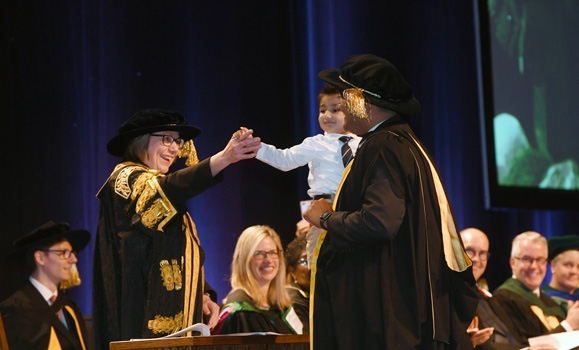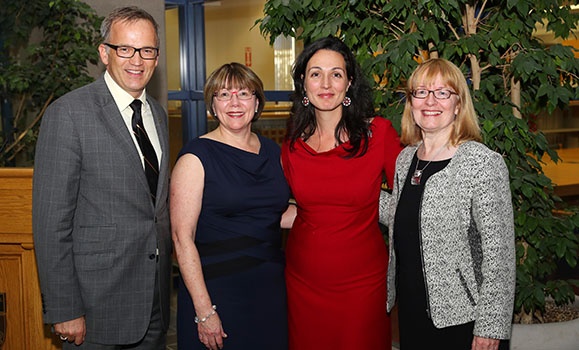This would normally be the time of year during which H¬ĢĽ≠‚Äôs chancellor would be presiding over Convocation ceremonies: shaking hands, tapping heads, giving hugs and posing for thousands of photos.
Graduation celebrations look a little different this year: . And among those sending their best are Dal’s outgoing and incoming chancellors: the Honourable A. Anne McLellan and the Honourable Scott Brison.
Brison was set to be formally installed as chancellor this spring, and while he shares graduates’ disappointment in not being able to gather in person, he’s glad to see grads are taking the time to mark the milestone in their own way.

Chancellor Brison.
‚ÄúI think ceremony and celebration are important,‚ÄĚ says Brison, who served as Member of Parliament for the Nova Scotia riding of Kings-Hants for over 20 years and held multiple cabinet positions including Minister of Public Works and President of the Treasury Board. ‚ÄúFor my family, it was a big deal.‚ÄĚ
Brison was part of the first generation of his family to have the opportunity to go to university ‚ÄĒ so, too, was McLellan. They both grew up in rural Nova Scotia: Brison in Cheverie in West Hants, McLellan just 40 minutes up the road in Noel Shore. And their paths towards becoming two of the most significant politicians in Canada both went through H¬ĢĽ≠.
‚ÄúDuring H¬ĢĽ≠‚Äôs 200th anniversary, people often asked me, ‚ÄėWhat does Dal mean to you?‚Äô‚ÄĚ says McLellan. ‚ÄúAnd I tell everyone who asks: Dal made the rest of my life possible. It‚Äôs that simple. A Dal education has that power, if you‚Äôre open to it.‚ÄĚ
From friends and colleagues to chancellors
Brison and McLellan have been friends for years, having served together in Paul Martin’s federal cabinet in the 2000s when McLellan was deputy prime minister.
‚ÄúI‚Äôm just thrilled that the next chancellor of H¬ĢĽ≠ is Scott Brison,‚ÄĚ says McLellan. ‚ÄúNot just because we‚Äôre both from Hants County, and former colleagues, but because he is such an enthusiastic, thoughtful supporter of what H¬ĢĽ≠ can do for an individual student, but also in community of ideas and excitement that can change not only our region but our world.‚ÄĚ
The feeling’s more than mutual. In fact, Brison says even though they’re dear friends, it’s even a bit intimidating taking over from McLellan after her five years as chancellor.
‚ÄúAnne is a remarkably accomplished person,‚ÄĚ he says. ‚ÄúShe‚Äôs somebody who, even when I was in opposition, we had that connection based on our roots. We‚Äôre friends, we‚Äôve served together, and as chancellor emeritus I know she‚Äôll stay deeply involved in Dal and help me learn the ropes.
 Chancellor Anne McLellan, greeting a grad and a family member on-stage at a past Convocation ceremony.
Chancellor Anne McLellan, greeting a grad and a family member on-stage at a past Convocation ceremony.
‚ÄúFrom what everyone has told me, Anne‚Äôs contribution [as chancellor] has been quite extraordinary. I hope to come close to that, and work hard in doing so.‚ÄĚ
The importance of ceremony and contribution
While the chancellor‚Äôs role is mostly ceremonial, they do serve on the Board of Governors and play an ambassadorial role for the university in general. In McLellan‚Äôs case, one of her proudest contributions during her time as chancellor has been . Located in the Schulich School of Law ‚ÄĒ where McLellan earned one of her two Dal degrees ‚ÄĒ the chair is currently held by Professor Naiomi Metallic.
‚ÄúReconciliation is a major challenge and opportunity for this country and for postsecondary institutions in particular,‚ÄĚ says McLellan ‚ÄúI thought it was important for the law school to have such a chair, and Naiomi is a truly outstanding legal academic who is making such a difference in this country.‚ÄĚ

Chancellor McLellan with Naiomi Metallic (second from right) as well as President Emeritus Richard Florizone (left) and Dean of Law Camille Cameron (right) at the launch of the Chancellor's Chair.
When asked about the memories she’ll take from her time as chancellor, McLellan reflects on the five-plus years of Convocation ceremonies she oversaw: all the graduates, their families, their stories and how much that little moment meant for each of them.
‚ÄúIt‚Äôs only maybe 20 or 30 seconds on that stage, but it was important to both me and Richard Florizone, who was president at the time, that every graduate felt the significance of that moment. They‚Äôve put so much work into getting there. You have to respect what they‚Äôve achieved and take on-board the sheer joy of those moments.‚ÄĚ
H¬ĢĽ≠ has committed to ensuring grads from the Class of 2020 are able to take part in a future Convocation ceremony when in-person events are able to resume, and Brison is eager to be there with them and other future graduates in the years ahead.
‚ÄúIt‚Äôs exciting to be part of that moment for students. I‚Äôm really looking forward to being up there on stage with our graduates soon.‚ÄĚ
An entryway to the world
Though they studied at Dal at different times, and in different programs ‚ÄĒ Brison in Commerce, McLellan in Arts and, subsequently, Law ‚ÄĒ they share the belief that H¬ĢĽ≠ helped them to connect with the broader world beyond their own home communities.
‚ÄúDal is a place where you have truly world-leading research happening in oceans, in agriculture, in batteries, in vaccines,‚ÄĚ says Brison. ‚ÄúBut it‚Äôs also a place where people from small communities in Atlantic Canada can earn a higher education. People who grow up in places like Cheverie or Kennetcook or Noel Shore or Gormanville can, at a place like H¬ĢĽ≠, get the skills they need to change the world.

Brison speaking in 2018 at the opening of the Emera IDEA Building, when he was a MP and President of the Treasury Board.
‚ÄúThat‚Äôs not an easy needle to thread ‚ÄĒ being both world-class and being there for people here in our region ‚ÄĒ but H¬ĢĽ≠ threads it quite exceptionally.‚ÄĚ
McLellan says part of Dal’s success is being large enough to attract such significant capacity and talent, while still being small enough to have meaningful, collaborative relationships that bring about big changes and big discoveries.
‚ÄúI think that‚Äôs why Dal is attractive to a lot of young people and their families from across Canada and around the world,‚ÄĚ she elaborates. ‚ÄúIt‚Äôs this place that has a high degree of intimacy but is also large enough that it can bring together people of exceptional talent who then, in turn, attract the attention of major industries or institutional partners globally.‚ÄĚ
Brison agrees, with a particular eye towards the need to work together to address global challenges ranging from climate change to rising xenophobia and populism.
‚ÄúThe problems of the world are not going to be solved by lawyers. They‚Äôre not going to be solved by business people. They‚Äôre not going to be solved by government people. And they‚Äôre not going to be solved by researchers. They‚Äôre going to be solved by all of them, working together. And Dal represents a living lab to educate a generation of people who are not only exceptional in their own silos, but really good at cross-collaboration across those silos. That‚Äôs where I think Dal can make a big difference.‚ÄĚ
And in doing so, H¬ĢĽ≠ provides opportunities to people from across the Atlantic region ‚ÄĒ something near and dear to Brison‚Äôs heart, and McLellan‚Äôs as well.
‚ÄúWhatever H¬ĢĽ≠ accomplishes globally, tackling these big issues, it is always a place for people like Anne and me to bloom, and to equip ourselves with what we need before going out into the world,‚ÄĚ says Brison.

